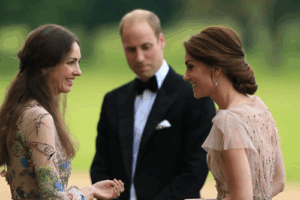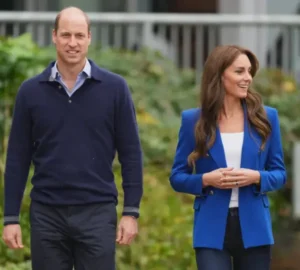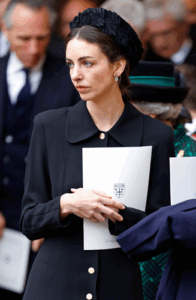 For months now, royal watchers and global press outlets alike have been buzzing with renewed speculation about Prince William’s alleged affair with Rose Hanbury — a rumor that has lingered in the shadows of royal gossip for years but resurfaced dramatically in early 2024 amid growing public concern over Kate Middleton’s mysterious absence from royal duties. What began as online whispers and tabloid headlines has now spiraled into one of the most talked-about royal controversies of the decade — forcing Rose Hanbury herself to finally break her silence.
For months now, royal watchers and global press outlets alike have been buzzing with renewed speculation about Prince William’s alleged affair with Rose Hanbury — a rumor that has lingered in the shadows of royal gossip for years but resurfaced dramatically in early 2024 amid growing public concern over Kate Middleton’s mysterious absence from royal duties. What began as online whispers and tabloid headlines has now spiraled into one of the most talked-about royal controversies of the decade — forcing Rose Hanbury herself to finally break her silence.
Rose Hanbury, formally known as Marchioness of Cholmondeley, is no stranger to high society. Once part of the royal couple’s close country circle, she and her husband David Rocksavage, the 7th Marquess of Cholmondeley, lived near William and Kate’s Norfolk estate at Anmer Hall. For years the couples were seen attending the same social events, country galas, formal dinners — until 2019, when rumours suddenly erupted suggesting that Rose and William had grown too close.
At the time, those claims were swiftly dismissed by Kensington Palace as “false and highly damaging.” Yet, despite the Palace’s refusal to comment further, the whispers never completely faded. Social media and certain tabloids continued to fuel speculation that a private rift had formed between Kate and Rose — allegedly leading the Princess of Wales to “phase out” her former friend from their social circle.
 Fast-forward to 2024: Kate Middleton suddenly disappears from public life, prompting wild theories online. With no detailed medical explanation from the Palace and an atmosphere of secrecy surrounding her condition, royal watchers began connecting the dots — whether real or imagined — between her absence and the old Rose Hanbury affair rumours. Then came the moment that reignited everything: late-night talk shows and gossip podcasts began joking about the supposed affair, naming Rose directly. What might have started as an off-hand quip became an international firestorm. Within days, Rose Hanbury’s name was trending across social platforms, and the decades-old allegations were front-page news once again.
Fast-forward to 2024: Kate Middleton suddenly disappears from public life, prompting wild theories online. With no detailed medical explanation from the Palace and an atmosphere of secrecy surrounding her condition, royal watchers began connecting the dots — whether real or imagined — between her absence and the old Rose Hanbury affair rumours. Then came the moment that reignited everything: late-night talk shows and gossip podcasts began joking about the supposed affair, naming Rose directly. What might have started as an off-hand quip became an international firestorm. Within days, Rose Hanbury’s name was trending across social platforms, and the decades-old allegations were front-page news once again.
Faced with the sudden surge of attention, Hanbury took an extraordinary step — through her legal representatives, she issued a rare and strongly worded statement. “These rumours are completely false,” her lawyers said, adding that the Marchioness “has no involvement of any kind in the baseless speculation surrounding the Prince and Princess of Wales.” They also confirmed that legal letters had been sent to several media outlets and broadcasters demanding immediate corrections and warning against further defamatory statements.
 Despite this, Buckingham Palace and Kensington Palace both maintained their long-standing policy of silence. There were no official denials, no confirmations — nothing but the quiet, inscrutable calm that the royal family is famous for. But that silence, instead of calming the public, seemed only to deepen curiosity. Online sleuths analysed old photos, videos, and body-language from past royal events, searching for any hint that might “prove” or “disprove” the affair. Behind the noise, Rose Hanbury herself has tried to retreat from public view. Friends of the family reportedly say she has been “deeply distressed” by the ongoing gossip and that the rumours have unfairly overshadowed her life and marriage. The Marchioness, a mother of three, has continued to attend formal events quietly alongside her husband, who serves as Lord Great Chamberlain of the United Kingdom — one of the most ancient ceremonial roles in the monarchy.
Despite this, Buckingham Palace and Kensington Palace both maintained their long-standing policy of silence. There were no official denials, no confirmations — nothing but the quiet, inscrutable calm that the royal family is famous for. But that silence, instead of calming the public, seemed only to deepen curiosity. Online sleuths analysed old photos, videos, and body-language from past royal events, searching for any hint that might “prove” or “disprove” the affair. Behind the noise, Rose Hanbury herself has tried to retreat from public view. Friends of the family reportedly say she has been “deeply distressed” by the ongoing gossip and that the rumours have unfairly overshadowed her life and marriage. The Marchioness, a mother of three, has continued to attend formal events quietly alongside her husband, who serves as Lord Great Chamberlain of the United Kingdom — one of the most ancient ceremonial roles in the monarchy.
Meanwhile, royal experts emphasise that there is no credible evidence supporting claims of infidelity. The story, they say, has taken on a life of its own — a product of online speculation, media sensationalism, and the modern appetite for scandal within an institution built on secrecy and decorum.
Still, the timing of Kate Middleton’s health issues, combined with the Palace’s tight-lipped approach, has allowed this narrative to thrive. In the court of public opinion, the lack of transparency becomes an invitation for imagination. The result: one woman’s name — Rose Hanbury — now forever linked to one of the most powerful families in the world, whether she likes it or not.
In the end, this saga has become more than just another royal rumour. It’s a reflection of how 21-st-century fame, fueled by social media and relentless curiosity, can transform private lives into public dramas — where silence is interpreted as guilt, and denial is rarely enough to quiet the storm.





